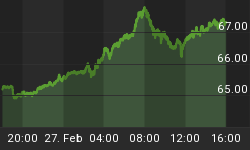As markets went on a rollercoaster ride last week, our economy is coming close to a day of reckoning for loose credit policies being followed by the Federal Reserve Bank. Simply, foreign banks we have been relying on to buy our debt are waking up to the reality of much higher default rates than predicted, and many mortgage backed securities have been reduced to "junk" ratings. Wall Street fears the possibility of tightening credit and the tightening of America's belts. Why, they say, "if Americans spend only what they can afford, think of the ripple effects throughout the economy!" This is the cry, as the call comes for the fed to cut rates and bail out companies in trouble.
More inflation is, however, never the answer to inflation.
The truth is that business involves risk, and businesses that miscalculate risk should be liquidated, so their assets can be reallocated to businesses that correctly judge risk and make profits. Instead, the Fed has injected $64 billion into the jittery markets, effectively amounting to a bailout that keeps these malinvestments afloat, but eventually they will become the undoing of our economy.
In addition to the negative reactions in financial markets, many Americans have taken on too much personal debt owing to exotic mortgage products and artificially low interest rates. Unfortunately, these families are now in the position of losing their homes in unprecedented numbers as the teaser rates expire and the real bills are coming due.
The real answers are, and always have been, found in the principles of the free market. Let the market set the interest rates. If we had been functioning under a true and transparent free market system, we would not be in the mess we are in today. Government, like the American household, needs to live within its means to get back on stable fiscal ground.
We've been headed in the wrong direction since 1971. This week marks the 36th anniversary of Nixon's decision to close the gold window, which convinced me to seek public office to call attention to the runaway money train that would come in the aftermath of that decision. The temptation to print and spend money with impunity, like the temptation to max out lines of credit, is too strong to for government to resist. While Nixon brokered exclusivity deals with OPEC to prop up demand for the tidal wave of green pieces of paper the Fed pumped into the markets, the world is tiring of marching to the beat of our drum in order to secure their energy needs. The house of cards Nixon built is now on the verge of collapsing on our heads, and on our children's heads.
As the dollar weakens, it becomes ever clearer that we need a return to sound, commodity-based money for a secure future. Money based on real value, not empty promises and secretive backroom machinations, is the way to get out of the current calamity without causing even bigger problems.















